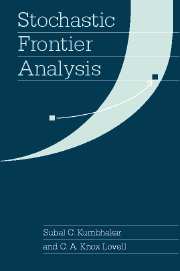Crossref Citations
This Book has been
cited by the following publications. This list is generated based on data provided by Crossref.
Currie, Kent A.
2000.
Expanding Competition in Regulated Industries.
p.
191.
Karagiannis, Giannis
Katranidis, Stelios D.
and
Tzouvelekas, Vangelis
2000.
Measuring technical, allocative and cost efficiencies of seabass and seabream farms in Greece.
Aquaculture Economics & Management,
Vol. 4,
Issue. 3-4,
p.
191.
Kumbhakar, Subal C.
Denny, M.
and
Fuss, M.
2000.
Estimation and decomposition of productivity change when production is not efficient: a paneldata approach.
Econometric Reviews,
Vol. 19,
Issue. 4,
p.
312.
Blank, Jos L.T.
and
Eggink, Evelien
2001.
A Quality-Adjusted Cost Function in a Regulated Industry: The Case of Dutch Nursing Homes.
Health Care Management Science,
Vol. 4,
Issue. 3,
p.
201.
Tzouvelekas, Vangelis
Pantzios, Christos J.
and
Fotopoulos, Christos
2001.
Economic Efficiency in Organic Farming: Evidence from Cotton Farms in Viotia, Greece.
Journal of Agricultural and Applied Economics,
Vol. 33,
Issue. 1,
p.
35.
Giannakas, Konstantinos
Schoney, Richard
and
Tzouvelekas, Vangelis
2001.
Technical Efficiency, Technological Change and Output Growth of Wheat Farms in Saskatchewan.
Canadian Journal of Agricultural Economics/Revue canadienne d'agroeconomie,
Vol. 49,
Issue. 2,
p.
135.
Rosko, Michael D.
2001.
Cost efficiency of US hospitals: a stochastic frontier approach.
Health Economics,
Vol. 10,
Issue. 6,
p.
539.
Harris, Richard I. D.
2001.
Comparing Regional Technical Efficiency in UK Manufacturing Plants: The Case of Northern Ireland 1974‐1995.
Regional Studies,
Vol. 35,
Issue. 6,
p.
519.
Heshmati, Almas
2001.
Labour demand and efficiency in Swedish savings banks.
Applied Financial Economics,
Vol. 11,
Issue. 4,
p.
423.
Karagiannis, Giannis
and
Tzouvelekas, Vangelis
2001.
Self-Dual Stochastic Production Frontiers and Decomposition of Output Growth: The Case of Olive-Growing Farms in Greece.
Agricultural and Resource Economics Review,
Vol. 30,
Issue. 2,
p.
168.
Rosko, Michael D.
2001.
Impact of HMO Penetration and Other Environmental Factors on Hospital X-Inefficiency.
Medical Care Research and Review,
Vol. 58,
Issue. 4,
p.
430.
Miller, Douglas J.
2002.
Entropy‐Based Methods of Modeling Stochastic Production Efficiency.
American Journal of Agricultural Economics,
Vol. 84,
Issue. 5,
p.
1264.
Hammond, Christopher J.
2002.
Efficiency in the provision of public services: a data envelopment analysis of UK public library systems.
Applied Economics,
Vol. 34,
Issue. 5,
p.
649.
Schmiedel, Heiko
2002.
Technological Development and Concentration of Stock Exchanges in Europe.
SSRN Electronic Journal ,
Kirkley, James
Morrison Paul, Catherine J.
and
Squires, Dale
2002.
Capacity and Capacity Utilization in Common-pool Resource Industries.
Environmental and Resource Economics,
Vol. 22,
Issue. 1-2,
p.
71.
Karagiannis, G.
Tzouvelekas, V.
and
Xepapadeas, A.
2002.
Current Issues in the Economics of Water Resource Management.
Vol. 23,
Issue. ,
p.
85.
Fox, Kevin J.
2002.
Efficiency in the Public Sector.
p.
1.
Tzouvelekas, Vangelis
Pantzios, Christos J.
and
Fotopoulos, Christos
2002.
Measuring multiple and single factor technical efficiency in organic farming.
British Food Journal,
Vol. 104,
Issue. 8,
p.
591.
Baños-Pino, José
Coto-Millán, Pablo
Rodríguez-Álvarez, Ana
and
de Sabando, V. Inglada-López
2002.
Essays on Microeconomics and Industrial Organisation.
p.
57.
Reinhard, Stijn
Lovell, C. A. Knox
and
Thijssen, Geert
2002.
Analysis of Environmental Efficiency Variation.
American Journal of Agricultural Economics,
Vol. 84,
Issue. 4,
p.
1054.



